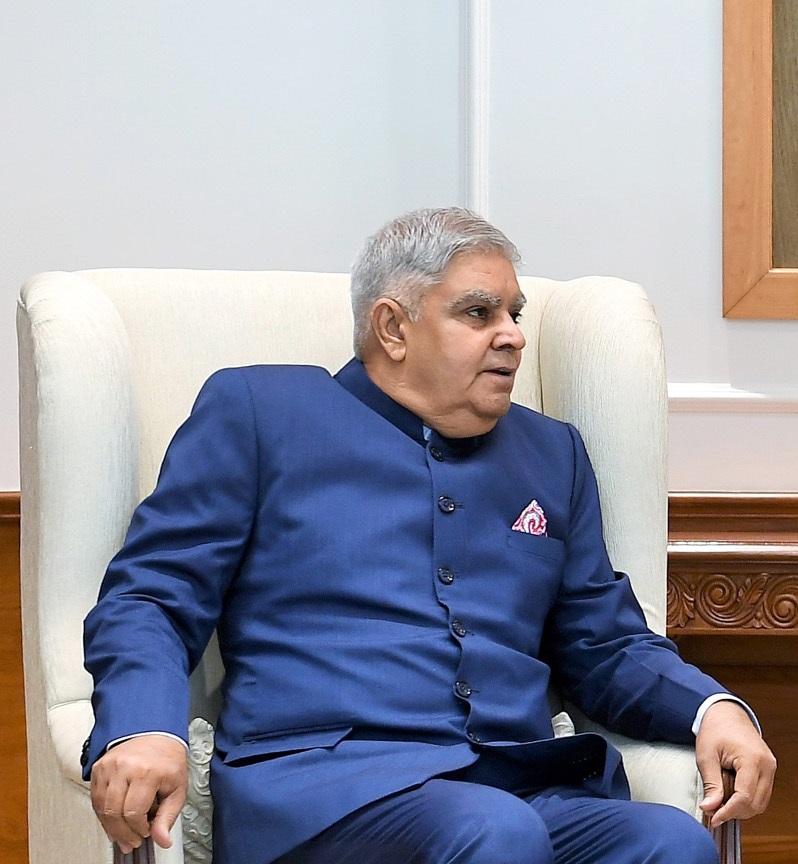VP Dhankhar Urges Civil Dialogue, National Unity Amid Rising Tensions
Citing India’s meteoric economic rise, Dhankhar noted that the country has moved from being among the five most fragile economies to now being in the top four globally.

- Country:
- India
In a powerful address at the ‘Sneh Milan Samaroh’ in Jaipur, Vice-President of India, Shri Jagdeep Dhankhar, delivered a wide-ranging and impassioned speech touching upon key issues, including political polarisation, constitutional responsibility, democratic discourse, and the urgent need for national unity. Speaking candidly before a gathering that included prominent political leaders and civil society representatives, the Vice-President emphasised that India’s democracy must rise above party lines and personal animosity.
"I Don’t Work Under Pressure": Setting the Record Straight
Addressing a recent public remark made by a former Chief Minister and his old political associate from Rajasthan, who alluded to political pressures, Vice-President Dhankhar asserted, “I am not under pressure, I do not pressure anyone, and I do not work under pressure.” He clarified that while he respected the concern expressed, such claims were unfounded.
“I publicly assure my friend and all citizens: I operate solely on constitutional principles and conscience. There is no need for concern,” he added, asserting his independence and commitment to the dignity of high constitutional office.
On Governors and the Misuse of Allegations
Commenting on the increasing politicization of constitutional roles, the Vice-President said Governors are often unfairly made “punching bags,” particularly when state and central governments are run by different parties. He warned against the alarming trend of dragging constitutional authorities like the President and Vice-President into political crossfire, calling it “inappropriate and dangerous for democracy.”
“This shift demands reflection and deep philosophical thought. It is unbecoming of our democratic ethos,” he said.
Political Decorum and the Danger of Hostility
Expressing concern about the current political atmosphere, Shri Dhankhar called it “intolerable” and unhealthy. He warned that unrestrained rhetoric, casual remarks, and sensationalism were hurting not only democratic values but the economy and international reputation of India.
“We must not forget,” he cautioned, “that power changes hands. Today’s ruling party may be tomorrow’s opposition. But that doesn’t make us enemies. The real enemies lie across our borders—not within.”
National Unity Above All
Vice-President Dhankhar appealed for national unity, especially in the global arena. “When we travel abroad, we don’t represent a political party—we represent Bharat,” he said, underlining that national interest must supersede partisan interests. “Bharatiyata is our pride. No matter our internal differences, on global platforms we must stand united,” he said.
India's Economic Rise: A Non-Partisan Triumph
Citing India’s meteoric economic rise, Dhankhar noted that the country has moved from being among the five most fragile economies to now being in the top four globally. “This is not about one government or political era. India’s growth journey—from the 1950s to today—is a collective national achievement,” he remarked.
He highlighted that India has outpaced countries like Japan, Germany, and the UK, and with continued momentum, could soon surpass even more. “No major nation in the world has achieved such an economic leap in such a short time,” he said.
The Role of the Opposition: From Adversary to Ally in Democracy
Emphasizing the value of a robust opposition, the Vice-President stated, “Opposition is not enmity. Democracy thrives on dialogue, dissent, and debate—what the Vedas call Anantavaad.” He warned that when opposing views are dismissed outright, democratic expression loses meaning.
“Engaging with disagreement strengthens one’s viewpoint. Debate is not division—it is democracy’s essence,” he said, urging political leaders to listen more and shout less.
Drawing Inspiration from the Constituent Assembly
Dhankhar invoked the work of the Constituent Assembly, which labored for nearly three years to draft India’s Constitution. “They had deep disagreements but never confrontation. Their tool was dialogue, not disruption,” he said, encouraging contemporary lawmakers to learn from the dignity and discipline of the nation’s founders.
Farmers and Direct Subsidy Reforms
In a notable policy remark, Vice-President Dhankhar advocated for direct benefit transfers to farmers, suggesting that every farming household could receive over ₹30,000 annually. He stated that fertilizer subsidies, if directly given to farmers, would give them the freedom to adopt natural or organic farming practices.
Referring to the U.S. model, he said, “There, the income of a farming household is often higher than the national average. That’s where we should be heading.”
Celebrating Indian Culture and Global Responsibility
He concluded by reflecting on India’s 5,000-year-old civilization, stating that no other country of comparable cultural depth holds one-sixth of the global population. “We must be careful with our words and actions. They affect our economy, our global standing, and our society,” he warned.
Dignitaries in Attendance
The event was attended by Governor of Rajasthan, Shri Haribhau Kisanrao Bagde; Speaker of the Rajasthan Legislative Assembly, Shri Vasudev Devnani; Leader of Opposition, Shri Tikaram Juli; and senior members of the Rajasthan Progressive Forum, including Shri Harimohan Sharma and Shri Jeetram Chaudhary.
Vice-President Dhankhar’s address struck a philosophical and pragmatic tone, calling for a return to civil discourse, mutual respect, and national unity—values vital for sustaining the world’s largest democracy.










